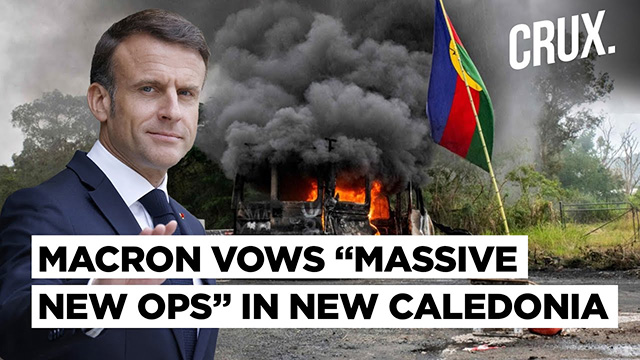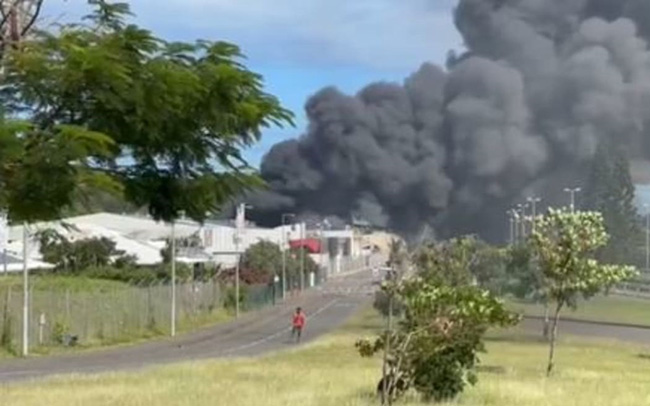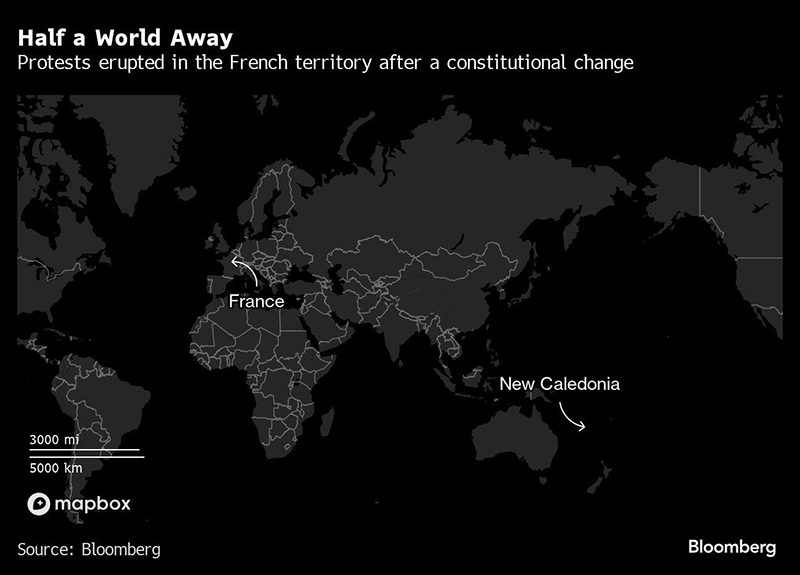
French President Emmanuel Macron touched down in New Caledonia and called for a “return to peace, calm and security” after days of violent protests in the Pacific territory sparked by a proposed change to the voting franchise.
During his visit, Macron met with political, economic and youth representatives, with the president saying his discussions will touch on reconstruction, economic support and “the most delicate of political questions” — the future of New Caledonia, informs Bloomberg.
The Pacific territory of 270,000 people has been in turmoil since May 13, when violence erupted over plans to extend voting rights to more residents, which indigenous Kanaks say would diminish their electoral influence. Paris declared a state of emergency in New Caledonia after several people were killed and businesses and cars were torched in rioting.
The unrest has also impacted nickel production with French miner Eramet SA saying it was running its local unit at minimum capacity. New Caledonia was the world’s third-biggest producer of the battery metal last year, accounting for around 6% of global output, according to the US Geological Survey.
New Caledonia is located about 17,000 kilometers (11,000 miles) from France, and just under 2,000 kilometers east of Australia. It was annexed in the mid-19th century and Paris gave the colony overseas territory status in 1946.
Under the terms of the Nouméa accord that sought to diffuse an earlier political crisis, voting in provincial elections was restricted to people who had resided in New Caledonia before 1998 and their children. The measure was aimed at giving greater representation to the Kanak population, who make up about 40% of the population.
The latest changes, backed by Macron, would allow people who had resided in New Caledonia for 10 years to vote, increasing the size of the electorate.
The territory has held three independence referendums, all of which have favored remaining part of France, though the most recent vote in 2021 was boycotted by indigenous leaders.
 The unrest comes amid proposed constitutional changes, which could strengthen voting rights for anti-independence supporters in New Caledonia.
The unrest comes amid proposed constitutional changes, which could strengthen voting rights for anti-independence supporters in New Caledonia.
Photo: Screengrab/NC la 1ère
A wave of civil unrest in New Caledonia, a French overseas territory in the southern Pacific that is a leading nickel producer, has halted mining operations and supported a rally in prices for the metal.
New Caledonia holds the world's fifth largest reserves of nickel, a metal mainly used in stainless steel and increasingly for electric vehicle batteries, and in 2023 ranked No. 3 globally in terms of mined nickel.
The archipelago's nickel mining industry dates back to the 19th century when the territory and its indigenous Kanak population were colonised by France.
New Caledonia's three main nickel companies are Koniambo Nickel SAS (KNS), Prony Resources New Caledonia (PRNC) and Societe Le Nickel (SLN). Each supplies its own processing plant. Together they generate around 13,000 direct and indirect jobs, according to the authorities.
KNS is owned by New Caledonia's northern province and global miner and trader Glencore, PRNC has several shareholders including commodity merchant Trafigura, while SLN - New Caledonia's historic nickel producer - is majority owned by French mining group Eramet.
Most mines have stopped operating, while SLN has reported fire damage to a conveyor at one mine. SLN has also reduced output to minimum capacity at its processing plant.
The unrest supported a rally in benchmark nickel prices on the London Metal Exchange to nine-month highs, before prices fell back. Reduced New Caledonian output could erode a global surplus.

Macron’s empire is falling apart, writes British Spectator with a touch of satisfaction.
Macron condemned the ‘absolutely unprecedented insurrection movement’ that has been shaking New Caledonia since mid-May. ‘No one has this level of organisation and violence’, he added, visiting a police station in the centre of the capital of Nouméa, where he praised ‘sang froid’ and ‘the professionalism’ of the police and gendarmes deployed on the ground.
‘The days and weeks that come will be difficult’, he added.
‘We have to hold on. There is no appeasement as long as there is this violence,’ he declared.
Not everyone is convinced. Australia and New Zealand have started evacuating their nationals.
A tour d’horizon of France’s global colonies (although we must not call them that) shows the indivisible republic melting down across the globe. French Polynesia, another French Pacific territory within the republic, is in continuous political turmoil with demands for independence. In the Caribbean, Guadaloupe and Martinique are regularly seized by riots.
Clinging onto the northeast coast of South America, French Guiana, wedged between Brazil and Surinam, with its rapacious mosquitoes and poisonous giant moths, has become a centre for drug smuggling and environmental catastrophe as illegal gold miners crossing the indefensible frontier with Brazil poison the Amazon with cyanide, overwhelming the police.
Central government has tried to respond to each of these crises by implementing a number of emergency plans, and by increasing its budgetary effort.
The French empire that dares not admit it’s an empire includes departments, territories and collectivities in North and South America, the Caribbean, and the Indian and Pacific oceans but only insignificant outposts seem indubitably secure. Off the coast of Newfoundland is Saint Pierre and Miquelon, which sends its sick to Canada for treatment.
There’s Saint Barthélemy, a billionaires’ paradise in the Caribbean, but nobody pays taxes there because of a strange treaty dating to the Napoleonic war in which Sweden conceded the island in return for trading rights in the port of Gotherburg.
Macron and his predecessors have presided not only over the troubled French de jure empire but also over the collapse of its de facto empire in Africa, where France’s failed military intervention has seen former French colonies turn their back on the motherland. La Franceafrique has become a crucible for militant Islamism, from Mali to Niger to the Côte d’Ivoire.
Much of north and west Africa was under direct French rule until the 20th century when the colonial ties were dissolved, brutally in the case of Algeria.
Haiti, now under the control of gangsters, is yet another failed former French colony, with a legacy of brutal slavery, re-imposed by Napoleon III after the failed revolution of Toussaint Louverture.
That the sun seems finally to be setting on the remaining French empire seems clear to everyone except the French. The indivisible republic is falling apart.
read more in our Telegram-channel https://t.me/The_International_Affairs

 11:43 27.05.2024 •
11:43 27.05.2024 •






















